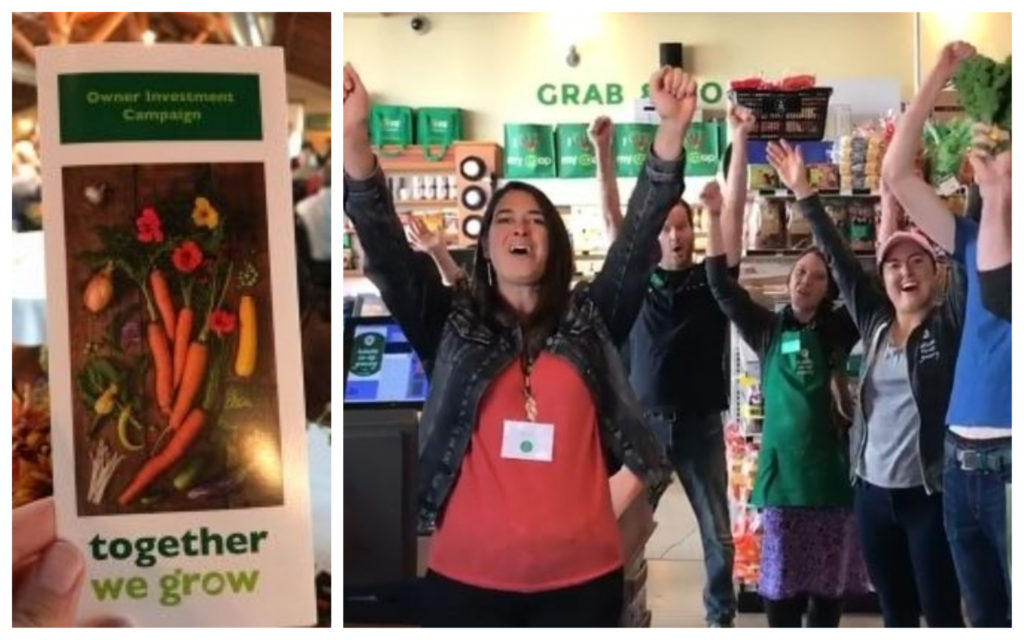
Research suggests that public speaking tops the list as the number-one fear-inducing activity for most people. Put that together with asking people for money, and you’ve got a potent combination for high anxiety.
If you have a project you believe in—especially if you’re a cooperator seeking to finance a startup or expansion—sharing your passion for why you think people should support it doesn’t have to be nerve-wracking. The good news is that there’s lots of support out there to help people and groups address those fundraising challenges.
That doesn’t mean it will be effortless, but with planning, organization and follow-through, groups will have a much greater likelihood for success.

So how do you get everyone involved to embrace “the ask?” Doing so is a crucial part of a successful fundraising campaign. Ben Sandel is a leadership development and co-op capitalization consultant who helps groups deal with this question all the time.
From Sandel’s perspective, the answer to that question is an understanding that co-op capitalization campaigns are the fulfillment of an important aspect of the cooperative identity—people coming together to share resources as owners and investing their own capital to fulfill a community need. It’s an important opportunity for participation that goes beyond shopping.
Investing in the co-op is an opportunity for owners to do something meaningful both for the co-op and with their money. “It’s an overlooked or misunderstood aspect of the co-op business model.”
Co-op investments offer an attractive alternative in a world saturated by capitalist investment practices that seek to maximize profits, sometimes at great expense to people and the environment. “You can earn a very fair rate of return investing in the co-op and your money is doing something really great. Conventional investments often involve things that we’d be appalled by if we knew about them.”
“As cooperatives we have a great story to tell about what investing in a co-op will do.” Sandel said that each co-op can talk about what they believe will resonate with their owners, but he also suggests harking back to the histories of cooperatives around the world. People have done amazing things to encourage investment. For example, the Rochdale Pioneers in 1840’s England encouraged investment and ownership in what at the time seemed like an impossible dream to raise money for a grocery co-op. “People would go out on Sundays knocking on doors to collect a penny toward co-op ownership. It shows how much people wanted it at the time. They had no track record, they just promoted the idea of buying into a dream.”
Clearly, ownership participation has long roots. For cooperatives today, that need for the same enthusiasm applies. The co-ops that achieve their goals tap into that energy. “The amounts of money that many cooperatives have been able to raise from individual members totaling in the millions is truly impressive.” Sandel cited that the startup Friendly City Co-op in Harrisonburg, VA (that he worked to help found) raised 96% of its financing from local people because it couldn’t secure conventional financing.
 Leslie Watson, board leadership development consultant, has also been instrumental in the creation and financing of two startup cooperatives in her community. She said people really resonate with the idea of investing locally because they know exactly what their money is doing, and that it’s an important concept for people to understand about co-op investing. And not only that, never having to rely on conventional capital could be a game-changer for co-ops. “What would it look like if our co-ops were 100% owner-financed? What if we as a movement were owner-financed?”
Leslie Watson, board leadership development consultant, has also been instrumental in the creation and financing of two startup cooperatives in her community. She said people really resonate with the idea of investing locally because they know exactly what their money is doing, and that it’s an important concept for people to understand about co-op investing. And not only that, never having to rely on conventional capital could be a game-changer for co-ops. “What would it look like if our co-ops were 100% owner-financed? What if we as a movement were owner-financed?”
She believes this will be possible when owners see the long-term potential in investing in their co-ops. This starts with co-op education. “We have to be mindful that when we ask people to invest in the co-op we do not talk about it as if it is a donation. We have to change that framing.” Watson acknowledges this is one of the challenges of co-op capitalization. “I always work to coach myself and others to talk about investing with an abundance mindset.”
“It is difficult for people to understand investing in the co-op outside of what they typically understand about investing and donations.” It’s important to move beyond the “donation jar” mentality, but to see the co-op as their business—one that needs an investment in its future. “This is one way they find their co-op inspiring, exciting, unique and special.”
Watson also pointed out how important it is to extend this mindset to everyone in a capital campaign—not just those with the means to make a big investment. “This is about owning the co-op collectively, so we can’t discount all the ways that people can contribute.” She has seen co-ops find creative ways to involve everyone on the economic spectrum, so that everyone can participate. “Capital campaigns have a multi-dimensional aspect them.”
Once a co-op has a clear idea of what it is asking people to invest in and why, successful fundraising for co-ops hinges on good organization and getting the proper support for it. Asking people to invest is not a one-and-done activity. It requires communicating constantly from multiple platforms. “So much flows from systems that include follow-through and persistence,” Watson said. “Groups that do it well have a champion. There has to be an honest acknowledgement that what it takes to raise money is a true heart, but also the capacity to do it.”
Have more questions?
Get in touch with one of our consultants.
